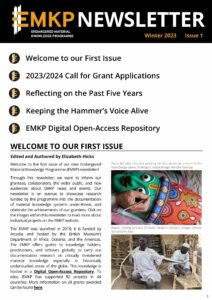Sign up to our Newsletter to keep up with news and announcements from the EMKP!
FIRST ISSUE (December 2023)
Issue 1 of the EMKP newsletter includes news, updates, and features focusing on the work of our grantees and our Digital Open Access Repository.
Issue highlight:
Keeping the Hammer’s Voice Alive
Emilia Ferraro and Sandra Wilson (with Elizabeth Hicks)
Ecuadorian silversmithing can be compared to an eco-system: a community of interacting organisms and their physical environment, a complex network of interconnected systems. Like all ecosystems, this one has a dangerous predator: the encroaching global economy. More and more Ecuadorian artisans are being forced to migrate elsewhere for better economic opportunities; whilst others are being driven from their craft by the rising price of materials and loss of access to natural resources. Under this mounting pressure, workshops are being closed, skillsets lost, and intergenerational networks of knowledge transmission shattered…

